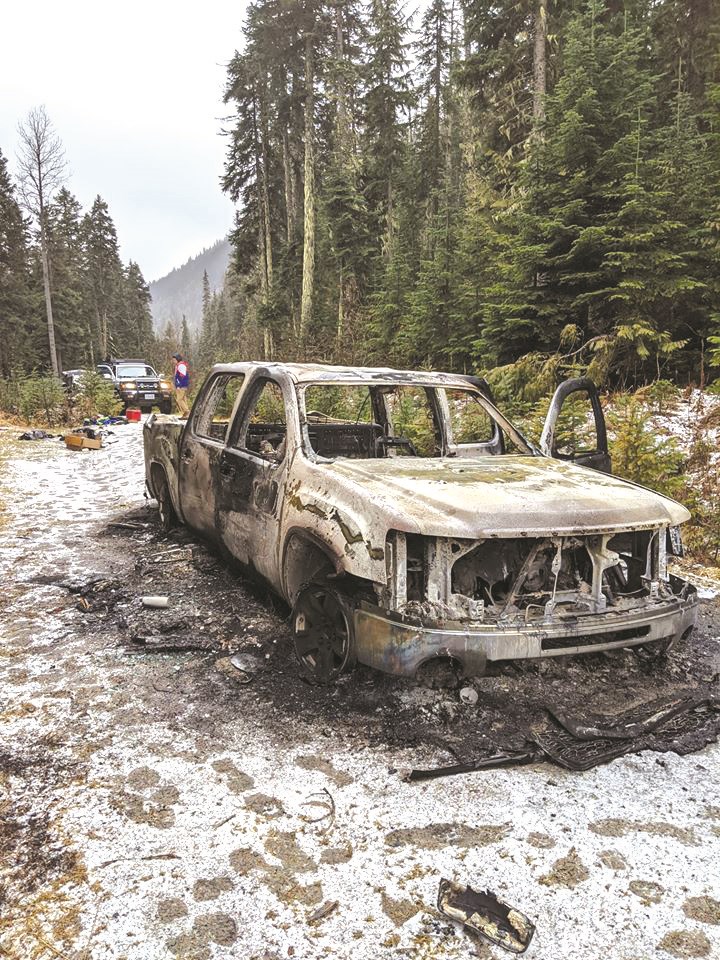The family of a missing Alberta man whose charred truck was inexplicably found in the remote backcountry near Pemberton last winter is petitioning investigators to treat the case as criminal, while the lead police agency on the file maintains there isn’t any compelling evidence to suggest foul play.
Twenty-six-year-old Marshal Iwaasa was last seen in Lethbridge, Alta. leaving his mother’s house on Nov. 17, six days before his burnt-out truck was found near the Brian Waddington hut, along with several personal items, including ID, clothes, a destroyed laptop, and three smashed cellphones that his family said he hadn’t used for years.
Several ground, air, and canine searches around nearby Phelix Creek—including a weeklong search in late June by private investigators the family has hired—turned up no sign of Iwaasa.
The trip, along with several details of the case that have since been publicized, convinced the Iwaasa family that Marshal never set foot in the Pemberton backcountry, an area he had never visited or expressed any interest in.
“It was quite difficult terrain and seeing that and actually experiencing it made me feel much more confident that my brother would not drive his truck up there himself,” said Paige Fogen, Iwaasa’s sister.
That suspicion was reinforced for Fogen after learning that her brother’s bank cards had not been used at any point on the roughly 14-hour drive from Lethbridge to the hut—even to fill up on gas. In fact, there is no record of Iwaasa using his bank cards at all between early November and his disappearance, which has prompted the family to request banking records going back six months to get a better sense of his spending habits. However, because the case is treated as a missing-person file, police cannot legally access historical records.
The family has also visited numerous gas stations along the route from Lethbridge to Pemberton to see if there is any surveillance footage of a truck matching Iwaasa’s—but, by and large, the gas station owners have refused to comply unless police make the request themselves.
“This goes into our whole push for this to be treated as criminal, because our understanding of this is that we’re hitting a lot of these barriers and the police are facing similar barriers because this is classified as a missing person’s [case], so it’s difficult to get historical information,” Fogen noted, adding that the family has been told that because it is a missing person’s case, investigators will not examine any fingerprints or other DNA that may be at the scene.
“The frank statement is that, without a body or a weapon, it’s not criminal,” Fogen said. “That seems like you’re not really planning ahead. You’re just waiting for those things to be found in order to classify it as criminal and find out what happened? It just doesn’t make sense to us.”
The family is also hopeful to learn the results of an investigation by local RCMP, which did not return a request for comment by deadline, to determine the cause of the fire that burnt Iwaasa’s truck. In Fogen’s mind, if the investigation shows that arson was the cause, then the case could be considered criminal.
“Nine months in—isn’t that crazy?” she said of the delay in concluding the fire investigation.
While the Lethbridge Police Service (LPS), the lead agency on the case, did not return a voicemail seeking comment, it did put out a statement this week following a press conference held by the Iwaasa family.
“From the onset of the missing person investigation, Iwaasa’s disappearance has been considered suspicious, however, as previously stated, there is no credible, corroborated or compelling evidence to suggest foul play or that the matter is criminal in nature,” the statement read in part, adding that not all information or evidence in the case has been released publicly, or to the Iwaasa family.
“LPS is aware of an online petition initiated by the Iwaasa family to have the missing person case re-classified as criminal, however, in order for any investigation to be deemed criminal there must be evidence to support that a crime has occurred.”
Not wanting to point fingers at any one agency, Fogen believes the problem runs deeper than the local RCMP or Lethbridge police.
“I think there needs to be a systematic overhaul in how these cases are treated,” she said. “Something needs to change, because there are a number of different missing person’s cases with no answers and that’s really not OK. It shouldn’t be that way.
“If the policies you have in place are not helping but hindering people … then something needs to change. Policies were made by people and they can be changed by people.”
The online petition can be found on change.org. At press time, it had garnered close to 4,000 signatures.




